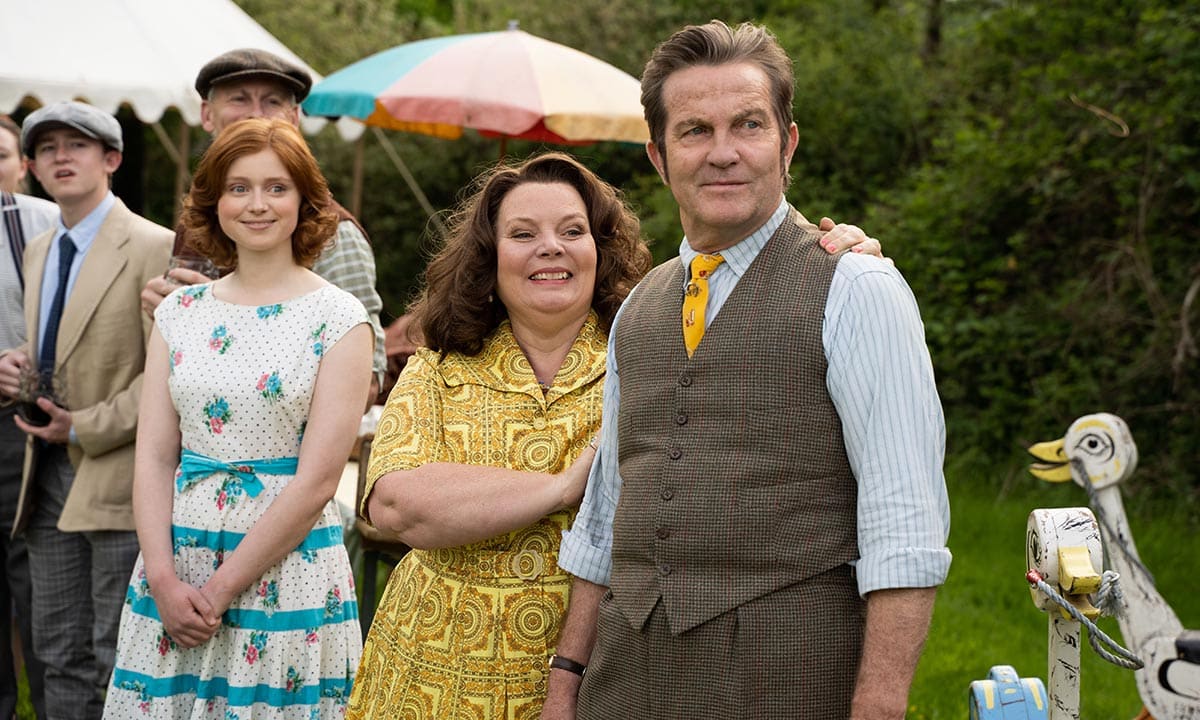‘The Larkins‘ is an ITV comedy-drama series about the Larkin family’s lives and misadventures. The novel is set in a rural setting in Kent, England, in the 1950s.
It follows Pop and Ma Larkin and their six children as they live in the gorgeous countryside and their daily antics and interactions with the many personalities of Littlechurch hamlet.
It also illustrates the impact of the entrance of the accountant Charly on the family, particularly their eldest daughter Mariette.
Pop and Ma, the cunning parents of the Larkin children who manage to outsmart every difficulty that comes their way, are played by Bradley Walsh and Joanna Scanlan in the seven-episode series.
Pop Larkin is a wheeler-dealer who uses his foresight to keep the village’s administrative affairs in order and avoid tax penalties.
At the same time, Ma Larkin looks after the family and tries to help anyone in need. Mariette, played by Sabrina Bartlette, is a beautiful Larkin daughter who is torn between two bright young men.
‘The Larkins‘ makes the audience wonder if it is based on a real family, thanks to excellent performances and a humorous yet realistic storyline. Let’s get to the bottom of the storey.
Is ‘The Larkins’ (2021 TV Series) Based On A True Story?
‘The Larkins,’ unfortunately, is not based on a factual storey. It is based on H.E Bates’ well-known 1958 novel “The Darling Buds Of May.”
The novel is the first in a five-part series about the Larkins family’s numerous experiences, and it has previously been turned into a TV series and the film ‘The Mating Game.’
Though not entirely based on genuine events, the author admitted in a 2018 interview that the Larkin family was his true inspiration.
He said he acquired recommendations from a family he encountered outside a shop while travelling through a Kent village with his wife Madge one summer evening.
“Two or three minutes later, a remarkable family emerged from the shop, in high spirits: father, a perky, sprightly character with dark sideburnings, Ma, a youngish handsome woman of enormous girth, wearing a bright salmon jumper and shaking with laughter like a jelly, and six children, the eldest of whom was a beautiful dark-haired girl of twenty or so,” he said.
Waiting in the rain. #TheLarkins, Sundays 8pm, @itv pic.twitter.com/n32VIJgPaY
— Tony Gardner 💙 (@Tonygardner) October 12, 2021
“At the same time, they were sipping on giant multi-colored ice creams and chewing on potato crisps.”
The author was captivated by the family’s unashamed delight and fun, and he began writing the novel the next day.
The Larkins also take inspiration from real-life English village life and the influence of new flamboyance on middle-class households.
The storey, according to Bates, might be understood as a revolution that swept postwar England, particularly the English countryside. In contrast to the scarcity of the early 1930s, peasants had begun to develop refined tastes and a sense of luxury, a topic reflected in the Larkins.
Pop Larkin is a junk trader involved in political scams. His failure to pay taxes has resulted in him amassing a large number of unusual riches, which he spends on extravagances such as a second television set.
Pop’s tax evasion brings him under the gaze of the tax officers, which he narrowly avoids by using his wits.
This, among many other examples, exemplifies the Larkin family’s proclivity to avoid problems and live lavishly.
The storey has been somewhat altered to appeal to modern sensibilities, with show creator Simon Nye hoping that it “captures the escapism of the Larkin family for the modern generation.”
Ma Larkin’s vivacity and compassion, in which she adopts a distant cousin’s abandoned infant and raises him as her own, exemplifies the rural people’s friendliness and warmth.
While the Larkin family and Littlechurch village are fictional, the intricacies of a normal rural English household and the laid-back communities are very genuine.
‘The Larkins’ also portrays the nosy, lighthearted banter and everyday lives of country residents in those times, providing viewers with a sense of relatability as they deal with their own problems.















